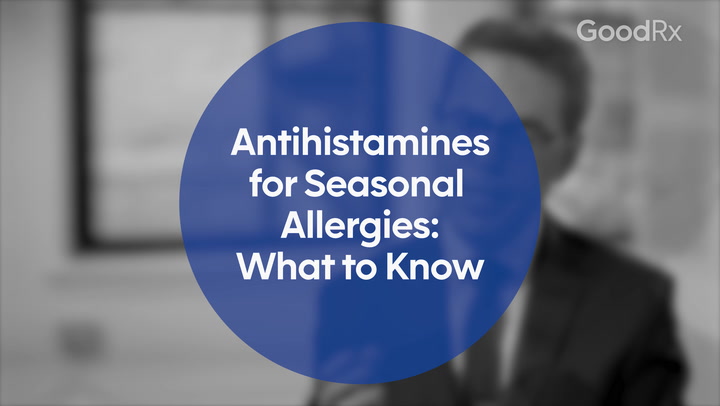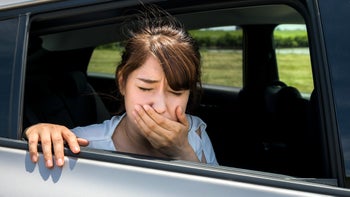
6 Dramamine Interactions You Should Know About
Key takeaways:
Dramamine (dimenhydrinate) is an over-the-counter (OTC) antihistamine. It’s used to treat and prevent symptoms of motion sickness.
Dramamine interacts with many of the same medications as Benadryl (diphenhydramine). These include sleep medications, sedatives, and anticholinergics.
Many Dramamine interactions can be prevented by avoiding certain combinations. It’s best to check with your healthcare provider or pharmacist before taking it. They can screen for possible interactions and make sure it’s safe for you to take.
Access savings on related medications
Table of contents

If you experience motion sickness, Dramamine (dimenhydrinate) can be a convenient over-the-counter (OTC) option for relief. But before you pick some up, there are a few Dramamine interactions you should consider.
Dramamine is very similar to Benadryl (diphenhydramine). So, it may not be surprising that it can make you sleepy. Dramamine can interact with other medications and make this side effect worse. This includes taking it with medications for anxiety, sleep, and allergies. And alcohol can be a problem, too.
Let’s discuss six important Dramamine interactions and how to manage them.
Save on the top 10 pet medications
Save big on common pet medications like Fluoxetine and Levetiracetam at your local pharmacy.

GoodRx is NOT insurance. GoodRx Health information and resources are reviewed by our editorial staff with medical and healthcare policy and pricing experience. See our editorial policy for more detail. We also provide access to services offered by GoodRx and our partners when we think these services might be useful to our visitors. We may receive compensation when a user decides to leverage these services, but making them available does not influence the medical content our editorial staff provides.
1. Benzodiazepines
Benzodiazepines (BZDs) are used to treat conditions like anxiety and panic disorder. Some are also used to help you sleep. Examples include alprazolam (Xanax), lorazepam (Ativan), and temazepam (Restoril). All BZDs are considered controlled substances.
BZDs can cause drowsiness, balance problems, and impaired thinking. Combining them with Dramamine can worsen these side effects. It’s best to avoid this combination.
Some people take BZDs only as needed. In this case, your healthcare provider may have you separate when you take Dramamine. But if you take BZDs regularly, this may not be an option. They can determine a treatment plan that’s safe for you.
2. Sleep medications
There are a variety of sleep medications available to help with insomnia. OTC options include Unisom Sleep Tabs (doxylamine) or Zzzquil (diphenhydramine). Prescription options include medications like Ambien (zolpidem) and Lunesta (eszopiclone).
Sleep medications are intended to make you drowsy. But when you combine them with Dramamine, you can get too drowsy. This could be dangerous if you’re driving or even just walking around. It could affect your ability to concentrate and cause falls or injuries.
Separating Dramamine from sleep medications may help. But you could still have added effects if you take them the same day. Check with your healthcare provider for how to safely take this combination.
3. Antihistamines
Dramamine is an antihistamine. When you take it with another antihistamine, you’re more likely to experience certain side effects.
First-generation antihistamines are known to make you drowsy. Dramamine falls into this category. Other examples include Benadryl, meclizine (Dramamine Less Drowsy, Bonine), and chlorpheniramine. Drowsiness, blurry vision, and dry mouth may be worse when they’re taken together.
Second-generation antihistamines don’t affect the brain as much. They’re often considered “non-drowsy” options. Examples include Zyrtec (cetirizine), Claritin (loratadine), and Allegra (fexofenadine). Side effects like dizziness and dry mouth may be more likely if they’re combined with Dramamine. And to a degree, drowsiness may be more common with this interaction.
It’s best to avoid taking Dramamine with another antihistamine. You may want to opt for medication-free motion sickness remedies instead. A couple examples include eating ginger or wearing an acupressure bracelet.
4. Other sedating medications
BZDs and sleep medications are considered sedatives. This means they slow down communication in the brain. Other medications can have sedative effects as well. Examples of these include:
Muscle relaxants like cyclobenzaprine (Fexmid, Amrix)
Sedatives can cause excessive drowsiness when combined with Dramamine. Rare, serious sedative effects like slowed breathing or coma are also possible.
It’s best to avoid combining Dramamine with medications that have sedative effects. But if you need to take both, talk to your healthcare provider first. They can tell you how to manage this interaction or recommend a safer alternative.
5. Anticholinergics
Medications like oxybutynin (Ditropan), hyoscyamine (Levsin), and antihistamines like Dramamine have anticholinergic effects. This is because they block the effects of a chemical in the body called acetylcholine.
Blocking acetylcholine can cause side effects like dry mouth, blurred vision, and constipation. Some can be more serious, like agitation and confusion. Older adults, and those with dementia, tend to be more sensitive to these effects. If you’re 65 or older, it’s recommended to avoid anticholinergics altogether.
Combining Dramamine with other anticholinergic medications can worsen these side effects. Your healthcare provider can help you manage this interaction, or recommend safer alternatives.
6. Alcohol
Alcohol can cause dizziness, making motion sickness symptoms worse. So, drinking alcohol with Dramamine won’t do you any favors. What’s more, combining Dramamine with alcohol can increase the risk of drowsiness.
The safest way to handle this interaction is to avoid alcohol with Dramamine. If you think you may drink alcohol, talk to your healthcare provider first. They can determine whether there’s a safe amount for you to drink.
When should I contact my healthcare provider about a Dramamine interaction?
Anytime you’re concerned about Dramamine interactions, you should contact your healthcare provider. Even if it’s a small problem, it’s better to double-check. They can advise you on how to avoid or handle interactions.
Since Dramamine is available OTC, your pharmacist can be a good resource before buying it. They can review your current medication list. This helps them identify potential interactions ahead of time.
If you’re experiencing any side effects that feel severe or life-threatening, get medical attention right away. This may include extreme sedation or slowed breathing.
The bottom line
Dramamine can interact with anxiety medications, sleep aids, and antihistamines. It can also interact with opioids, alcohol, and muscle relaxants.
You can avoid Dramamine interactions by talking to your healthcare provider or pharmacist first. They can recommend how to safely take the medication, or suggest a safer alternative.
Why trust our experts?



References
Fixen, D. R., et al. (2019). 2019 AGS beers criteria for older adults.
National Institute of Diabetes and Digestive and Kidney Diseases. LiverTox: Clinical and research information on drug-induced liver injury.
National Institute on Alcohol Abuse and Alcoholism. (2014). Mixing alcohol with medicines.
Sam, C., et al. (2022). Physiology, acetylcholine. StatPearls.
Was this page helpful?
Related Articles
Browse medications
View AllResearch prescriptions and over-the-counter medications from A to Z, compare drug prices, and start saving.
















